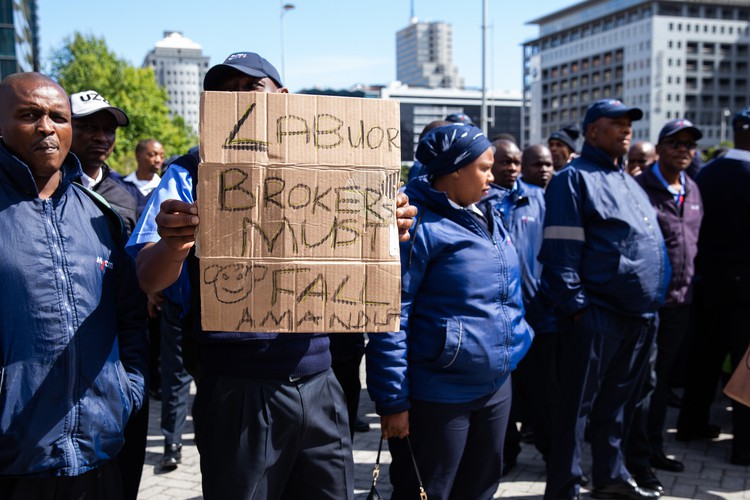Cape Town Civic Centre locked down during MyCiTi protest
City says it cannot insource aggrieved employees
The Cape Town Civic Centre was shut down on Wednesday during a protest by about 100 former MyCiTi strikers.
The protesters, mostly former employees of the Vehicle Operating Companies (VOCs) contracted to the City of Cape Town on the MyCiTi project, are demanding that the City employ them directly. They say their working conditions and benefits are not as good as people doing the same work but employed directly by the City.
In a statement Luthando Tyhalibongo, spokesperson for the City of Cape Town, said the protesters had “forced their way” into the Civic Centre which had resulted in the building being locked down. The protesters had been removed, he said at 1:25pm, but the building remained “in partial lockdown to ensure the safety of employees.”
The workers went on an unprotected strike last month and most were dismissed when they ignored calls to return to work. The group includes bus drivers, marshals and cleaners.
The newly appointed Mayoral Committee Member for Transport and Urban Development, Felicity Purchase, told GroundUp that the City could not employ the workers directly. She said the City had committed itself to the empowerment of the minibus-taxi industry by signing 12-year contracts with the VOCs in November 2013 to operate the MyCiTi service. Routes to Hout Bay and Hangberg, Atlantis, and Table View were run by the VOCs set up by the taxi associations, she said.
“These contracts were negotiated as part of our strategy to empower and formalise the minibus-taxi industry. Most of the workforce like the drivers and many others, have come directly from the taxi industry and have benefited through permanent employment contracts and other benefits as stipulated in their conditions of employment with the VOCs and the station management contractor,” said Purchase.
The Western Cape High Court granted an interdict on 18 October preventing the strikers from coming closer than 100m to MyCiTi stations, depots or buses.
One of the bus drivers, Patrick Mandisa, said that the workers were protesting because they had not had feedback after a meeting with Executive Mayor Dan Plato last week.
On 14 November Plato met the leaders of the dismissed strikers. Mandisa said the mayor had promised to respond the next day but had not done so.
In an email to GroundUp the spokesperson for the City, Greg Wagner, said the mayor and city officials had met a delegation of workers and the mayor had asked the officials to look into their complaints.
Purchase said the City had approached the South African Road Passenger Bargaining Council, where annual wage negotiations take place, early in November. The Council had made a senior commissioner available to facilitate talks between the workers and the VOCs.
“Unfortunately, the talks did not succeed in resolving the impasse.”
She said that three MyCiTi buses had been burnt since the start of the strike on 15 October and three others damaged. The replacement cost was about R13 million – “a loss the City can ill afford,” she said.
Support independent journalism
Donate using Payfast

Don't miss out on the latest news
We respect your privacy, and promise we won't spam you.
Next: Struggle to rebuild after fire destroys Khayelitsha children’s home
Previous: Activists lose bid to stop coal mine
© 2018 GroundUp.
This article is licensed under a Creative Commons Attribution-NoDerivatives 4.0 International License.
You may republish this article, so long as you credit the authors and GroundUp, and do not change the text. Please include a link back to the original article.

